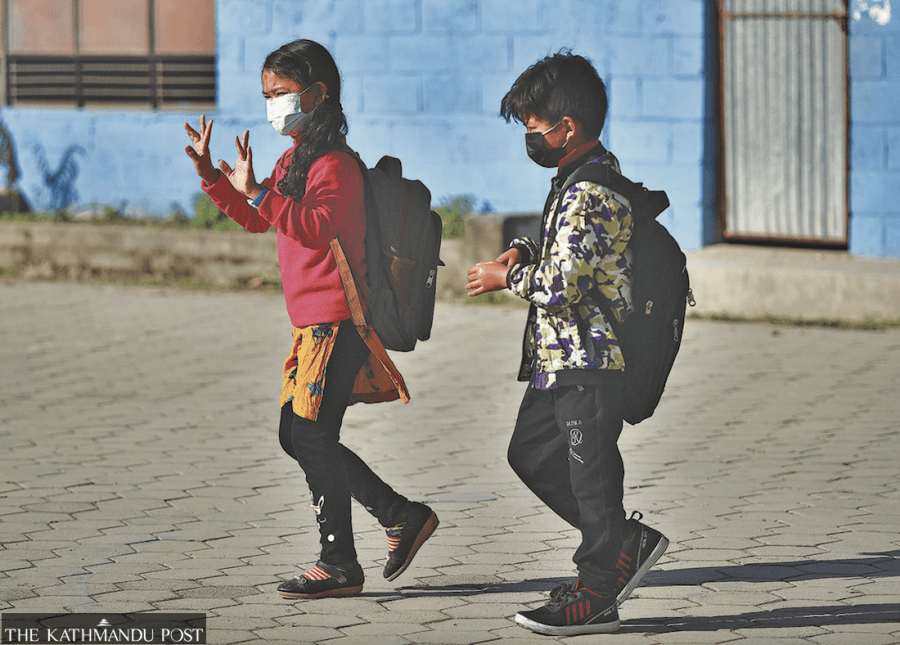
Sending children to school is still full of risk, child health experts say. Post File Photo
Two-and-a-half years old Kripa, from Tarakeshwar Municipality has been admitted to playgroup at a school on Sunday on the Saraswati Puja day. The school had offered a discount in the admission fee for the new students on the occasion of Saraswati puja, a day regarded as auspicious for initiating small children in the path of learning.
“Her parents are happy to send their daughter to school but I am worried about Covid infection,” said Krishna Bahadur Shrestha, Kripa’s grandfather, who was waiting to pick his granddaughter outside the school.
“My granddaughter cannot even speak properly but they (son and daughter-in-law) did not listen to my suggestions not to hurry to send her to school.”
Like the one Kripa has been admitted to, many schools in Kathmandu Valley have started in-person classes in the midst of the pandemic, ignoring the risk to the lives of small children and their elderly grandparents at home.
Several local units in Kathmandu Valley admitted that schools in their areas have started physical classes long ago, which is also a violation of the government rules.
A meeting of the Covid-19 Crisis Management Coordination Center has decided to let the schools resume in-person classes from February 13 only.
But some municipalities through their municipal committee meetings have already decided to allow schools to reopen.
“We have decided through a municipal committee meeting to allow schools to resume in-person classes,” Shanti Nepal, deputy mayor at Gokarneshwar Municipality in Kathmandu, told the Post. “Schools and academic institutions in our jurisdictions have already been running in-person classes.”
When asked about the risks of infection to the children, Nepal argued that it would not be wise to restrict only the children from their right to go to school.
She said that weddings and bratabandha functions are being held without restrictions. People are participating in parties and eating without following safety measures. “If the coronavirus doesn't spread from such events and crowds, there is no proof that it only spreads from schools,” said Nepal.
Rajaram Pudasaini, spokesperson for Kageshwari-Manohara Municipality, said that his office has given permission to run classes above the fifth grade only. He also added that his office will monitor whether the schools have been strictly following public health measures including wearing of face masks and physical distancing.
Janardan Adhikari, health coordinator at Tarakeshwar Municipality, admitted that schools in the municipality have been running in-person classes.
Officials at Nagarjun Municipality meanwhile said the schools were allowed to only take admissions and not resume physical classes.
Child health experts say that resuming in-person classes in the midst of the pandemic is full of risk to both small children and their elderly grandparents at home.
“We do not have real data on Covid infection among children as people have stopped seeking testing both for themselves and their children,” said Dr Rita Hamal, a consultant paediatrician. “But that doesn't mean children do not get infected. Even if most children do not get serious, they take the infection home, pass it to their parents and grandparents.”
According to the data provided by the Ministry of Health and Population, 91 children under 20 years old were infected with Coronavirus on Tuesday. Of them, 29 are under 10 years old.
Public health experts say that maximum precautions should be taken if the schools have to run in-person classes.
“They should first make sure if the classrooms are properly ventilated, if they can maintain social distance, properly enforce safety measures— wearing of face masks, handwashing, among others,” said Dr GD Thakur, former director at the Epidemiology and Disease Control Division. “Otherwise, the remaining people, who are not infected yet will be infected from children.”
Doctors say even if Omicron, a new variant of SARS-CoV-2 currently in circulation, is of mild type and does not cause serious illness in many people, a new variant of the coronavirus can emerge at any time, as the virus keeps mutating. They stressed the need for enforcing safety measures strictly.
Officials at the Ministry of Health and Population said the ministry has not recommended resumption of physical classes as time is still not ripe for reopening schools.
“Infection rate is still too high to allow schools to resume physical classes,” Dr Sangita Mishra, spokesperson for the Health Ministry, said. “Starting in-person classes for small children will be riskier, as children under 12 are not vaccinated yet.”
Health authorities throughout the country have been currently administering Covid-19 vaccine to children between 12 and 17 years. The Health Ministry has also decided to administer vaccines to children between five and 11 years but there is no Covid-19 vaccine for children under five years.
On Wednesday, 2,401 people tested positive for Covid-19—1,851 in 11,603 polymerase chain reaction tests and 550 in 4,753 antigen tests. In the last 24 hours, 14 people died of coronavirus. Active cases stand at 36,181 throughout the country.
So far, 15,932,041 people have been fully vaccinated.
Kripa’s both grandparents have multiple underlying conditions—asthma, diabetes and hypertension—and doctors attending to Covid-19 patients say those with underlying conditions are at risk of dying due to Covid infection. They said that most of the recent Covid-related deaths involve elderly people and those with underlying conditions.
“We are not worried about the infection, as we are old and have lived our lives,” said Krishna Bahadur. “We are worried for our grandchild.”













